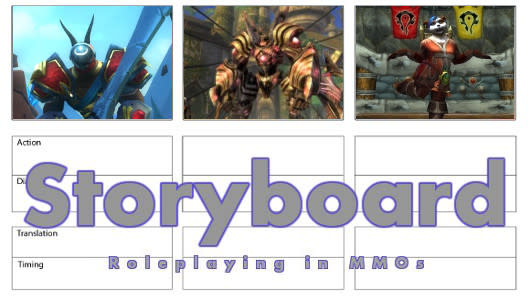Storyboard: Pacing and numbers in roleplaying
I attend a lot of roleplaying events. This is not a surprise to anyone, I'm sure. What also probably isn't a surprise is how many of them turn out to be slow, meandering, and generally not all that great. It's like wading through any bunch of player-generated content; you've got a lot of people who have a great idea in their heads to the point that they'll ignore signs about how badly that idea will shake out in reality.
A lot of it comes down to two major issues: pacing and numbers. In some ways, this is an extension of the problem of people not playing to the medium, but it's also a problem of pacing and overall event flow. If you're not thinking about how you're pacing an event, you haven't fully thought things out, and if you aren't thinking about what that means for the people attending, you're going to wind up with a lot of bored people complaining via whispers.

Size matters
Two people roleplaying strike up a pretty even cadence. I do something, you do something, I do something, etc. There's the occasional cue for someone to go on a monologue, but even that's fairly obvious when it happens. Three people are a bit more complex, but it's still possible to establish a fairly steady rhythm without anyone falling behind.
When you get a dozen people into something, the cadence falls apart. There's no way to have any semblance of turns or give-and-take. The result is that the slowest typists are more or less thrown under the roleplaying bus and everyone else is constantly wondering whether or not something more should be said. Is everyone waiting for me to speak? Have I done too much? Not enough? What's the protocol here? I don't want to cut someone off!
For a party, this isn't a problem. If everyone's just milling about and chatting with whomever, you don't need to worry about an overall cadence. But if everyone is supposedly engaged in another activity, then you also have to realize that large groups are miserably slow at doing something.
I've said in the past that I'm fond of groups doing content as a means of roleplaying, and this is part of the reason why. When you're in the midst of an in-character exploration and fighting off enemies along the way, snippets of conversation here and there are more than enough to convey the sense that your character is doing something. When you're trying to coordinate an in-character fighting tournament in which no actual fighting takes place, everything is going to be much slower as people try to parse what's going on.
Smaller groups can find a cadence; larger groups can't. If you need something to do with a large group of roleplayers, consider something not purely imaginary. Yes, all these games are imaginary -- work with me here.

Have time in mind
If you consistently show up half an hour late to your job when you have scheduled hours, you will be fired. If you consistently do three-quarters of the work you're supposed to do at a job that judges you by quotas, you will be fired. If you schedule an event to take place at noon and then show up to run your event at 12:45... well, you won't be fired. But I won't be coming to another event that you run because obviously you don't even respect it enough to be there on time.
I realize that a lot of people love to have big, sprawling RP events that start around a certain time and go on until whenever, designated by question marks to let you know that almost anything could happen. But you are holding those events in a real world where people have stuff to do. People have work the next day. There are showers to be taken, there are rooms to be cleaned, there's a big Netflix queue to work through. I love roleplaying, sure, but I also love Pacific Rim, and that doesn't tell me it's going to run for two hours and then run on for four with no sign of stopping.
Have a start time and an end time in mind. If the event starts to approach the end time with no actual end in sight, you might want to call it early because you underestimated how long things would take. But don't take the far more common route of assuming that people have an infinite well of time with which to roleplay on any given night. Assume that you're taking up time and that you want to make the most efficient use of that time as possible.
Gauge interest
Here's a phrase I don't see asked enough about roleplaying events: "Is anyone interested in something along these lines?"
I've been in groups of roleplayers where no one wanted to be engaged in romantic storylines. I've been in groups that really loathed military-style organization. I've seen groups that hated trying to decipher mysteries. And I've been in groups that love all of the above. I've also watched people in all groups run the events that they wanted to run, even though a lot of the people involved had little to no interest in that sort of event.
Some of that comes down to guild description, but a lot of it also comes down to the exact composition and personal preference. I can describe a guild as a small group of military professionals, but that covers concepts from The A-Team to Band of Brothers to Star Trek. Rather than deciding that you're running X, check first to see if other people are interested in X at all.
For that matter, don't get into the "everyone must attend" mentality. Some people will attend and some won't, and that's not only normal but actually better. You want the people who show up to be happy about being at the event, not forced there through a combination of guilt and irritation. Optional events might not gather the same number of participants, but the people who are there are all happy to be there.
Feedback, like always, is welcome in the comments below or via mail to eliot@massively.com. Next week, let's talk about why your character sticks around when perhaps she ought to leave. The week after that, I'm going to complain about /random. (Or the equivalent for your chosen game.)

Every Friday, Eliot Lefebvre fills a column up with excellent advice on investing money, writing award-winning novels, and being elected to public office. Then he removes all of that, and you're left with Storyboard, which focuses on roleplaying in MMOs. It won't help you get elected, but it will help you pretend you did. If you need a refresher, check out the Storyboard Library.


